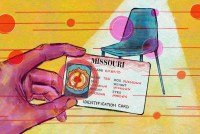He Fell Ill on a Cruise. Before He Boarded the Rescue Boat, They Handed Him the Bill.
A man from Michigan was evacuated from a cruise ship after having seizures. First, he drained his bank account to pay his medical bills.
A casi tres meses del tiroteo en el desfile del Super Bowl de los Kansas City Chiefs, que dejó al menos 24 personas heridas, recuperarse de esas heridas es algo profundamente personal e incluye una sorprendente área gris de la medicina: si las balas deberían o no extraerse.
Three People Shot at Super Bowl Parade Grapple With Bullets Left in Their Bodies
Despite the rise of gun violence in America, few medical guidelines exist on removing bullets from survivors’ bodies. In the second installment of our series “The Injured,” we meet three people shot at the Kansas City Super Bowl parade who are dealing with the bullets inside them in different ways.
Los hirieron en el desfile del Super Bowl: un mes después se sienten olvidados
Durante el primer mes, los líderes comunitarios de Kansas City han discutido cómo atender a las personas que quedaron atrapadas bajo el fuego cruzado y cómo distribuir los más de $2 millones donados a los fondos públicos para las víctimas bajo el doloroso impacto inicial.
As money flows to abortion rights initiatives in states, some donors focus on where anger over the “Dobbs” ruling could propel voter turnout and spur Democratic victories up and down the ballot, including in key Senate races and the White House.
They Were Injured at the Super Bowl Parade. A Month Later, They Feel Forgotten.
In the first of our series “The Injured,” a Kansas family remembers Valentine’s Day as the beginning of panic attacks, life-altering trauma, and waking to nightmares of gunfire. Thrown into the spotlight by the shootings, they wonder how they will recover.
States Get in on the Prior Authorization Crackdown
Last month, my colleague Lauren Sausser told you about the Biden administration’s crackdown on insurance plans’ prior authorization policies, with new rules for certain health plans participating in federal programs such as Medicare Advantage or the Affordable Care Act marketplace. States are getting in on the action, too. Prior authorization, sometimes called pre-certification, requires patients […]
States Target Health Insurers’ ‘Prior Authorization’ Red Tape
Doctors, patients, and hospitals have railed for years about the prior authorization processes that health insurers use to decide whether they’ll pay for patients’ drugs or medical procedures. The Biden administration announced a crackdown in January, but some state lawmakers are looking to go further.
These Patients Had to Lobby for Correct Diabetes Diagnoses. Was Their Race a Reason?
Adults who develop one autoimmune form of diabetes are often misdiagnosed with Type 2 diabetes. Those wrong diagnoses make it harder to get the appropriate medications and technology to manage their blood sugar. Many Black patients wonder if their race plays a role.
Ohio votó a favor del aborto. Podrían seguir otros 11 estados el próximo año
El impulso para llevar el polémico tema a los votantes llega después de la serie de victorias en las votaciones del año pasado a favor del derecho al aborto en seis estados: California, Kansas, Kentucky, Michigan, Montana y Vermont.
Ohio Voted on Abortion. Next Year, 11 More States Might, Too.
Ohio is the latest state where voters have directly weighed in on abortion, and the next wave of such ballot measures is in the works in at least 11 other states, including Missouri.
Ohio Votes on Abortion Rights Today. Eleven States May Follow in 2024.
Voters in Ohio are deciding whether to add abortion rights protections to the state’s constitution today. The vote comes on the heels of last year’s string of ballot measure wins for abortion rights in six states: California, Kansas, Kentucky, Michigan, Montana and Vermont. But this is just the start. Next year, 11 more states could see abortion-related […]
Funyuns and Flu Shots? Gas Station Company Ventures Into Urgent Care
A Tulsa-based gas station chain is using its knowledge of how to serve customers and locate shops in easy-to-find spots to enter the urgent care industry, which has doubled in size over the past decade. Experts question how the explosion of convenient clinics will affect care costs and wait times.
The Hospital Bills Didn’t Find Her, but a Lawsuit Did — Plus Interest
Recovering from emergency gallbladder surgery, a Tennessee woman said she spent months without a permanent mailing address and never got a bill. She was sued by the health system two years later.
Familias huyen de los estados que niegan atención de salud a las personas trans
Más de una cuarta parte de los adultos trans encuestados por KFF y The Washington Post a fines del año pasado dijeron que se mudaron a otro vecindario, ciudad o estado en busca de un ambiente más tolerante.
Medical Exiles: Families Flee States Amid Crackdown on Transgender Care
As more states restrict gender-affirming care for transgender people, some are relocating to more welcoming destinations, such as California, Illinois, Maryland, and Nevada, where they don’t have to worry about being locked out of medical care.
Can a Fetus Be an Employee? States Are Testing the Boundaries of Personhood After ‘Dobbs’
Laws granting rights to unborn children have spread in the decades since the U.S. and Missouri supreme courts allowed Missouri’s definition of life as beginning at conception to stand. Now, a wrongful death lawsuit involving a workplace accident shows how sprawling those laws — often intended to curb abortion — have become.
Temp Nurses Cost Hospitals Big During Pandemic. Lawmakers Are Now Mulling Limits.
Missouri is considering making it a felony to jack up temporary health care staffing prices during a statewide or national emergency. It’s one of at least 14 states looking to reel in travel nurse costs, after many hospitals struggled to pay for needed staffers earlier in the covid pandemic.
Decisión de Eli Lilly de bajar el precio de su insulina logrará cambios históricos en los costos
Expertos en precios de medicamentos celebraron la noticia de Eli Lilly y otros esfuerzos. Y estas otras iniciativas para llevar al mercado insulina de menor costo, a su vez, presionarían a Eli Lilly para que mantuviera sus precios bajos.
Eli Lilly Slashed Insulin Prices. This Starts a Race to the Bottom.
Eli Lilly’s news that it plans to cut insulin costs for patients will help, not hinder, the recent efforts in California and by entrepreneurs such as Mark Cuban to offer lower-cost alternatives, drug pricing experts said.




















